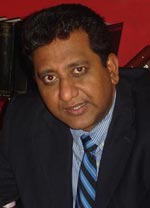GUYANA recently joined in observing World Press Freedom Day 2014, and during an interview on freedom of the press, Attorney-General and Minister of Legal Affairs, Mr Anil Nandlall reiterated his call to local journalists to partner with the government towards building a better nation.

Giving his views on what freedom of the press means during an interview on Channel 28, Minister Nandlall said, “Apart from life itself, in my view there is no greater freedom to the human being than freedom of the press, freedom of expression, and freedom of thought.”
Noting that societies have been largely built upon the freedom of being able to think, Minister Nandlall said, “I often express my view by quoting a judge of the Supreme Court of India who said that intellectual paralysis creeps over any society that denies, in however subtle form, attempts in any manner whatsoever to interfere with freedom of thoughts and expression of its people.”
With the PPP/C administration holding a similar view, Minister Nandlall said “that is why when we assumed office, as a political party, we held on to a long and glorious record of standing on the side of press freedom and against those who may want to interfere with and censor the press in however subtle form.
“That is our track record. And when you look at our accomplishments in government, you see very clearly that over the last 22 years, you see the proliferation of over 20 privately- owned television outfits operating in the country; you see two newspapers operating, established under this government; you see over eight or more radio stations operating in the radio spectrum.”
He said that with the establishment of all these and more media outlets, a lot of the content coming from these entities is not government friendly, but yet they are allowed to operate without any hassle.
“They are not supposed to be friendly,” he said, “but the point is that they are operating under a free environment, where they are free to disagree with the government; they are free to criticise the government. And not one of them have I heard come forward to make an allegation that any member of the government ever attempted to intimidate them, or to impose upon them a view or to express any form of censorship on them.”
Noting that he is of the firm belief that Guyana has acceptable standards overall, in terms of freedom of the press and freedom of expression, the Minister said, “I stand by my comments made, [that] our society is a testimony of the freedom that exists in this country. How can we assess where we are, if we cannot reflect from where we have come?”
Recalling that Guyana is notorious for abusing reporters, Minister Nandlall said: “A writer from the Catholic Standard was murdered; some were jailed; some fled the country. There was only one source of information in the country; the government controlled that. The political parties, when they attempted to speak to their supporters, were deprived of materials needed to do so.”
But in spite of all this, he said, the PPP/C pressed on with its fight for press freedom. “We have to refer to the past to understand what existed in this country, and move to the present; so I have no doubt that we satisfy international standards when it comes to freedom of the press and freedom of journalists to discharge their function and to pursue their trades, ” he said.
When compared with India, where eight journalists were assassinated in 2013 in the discharge of their function, and the ‘big’ United States, whose world rating has dropped by as much as 13 points, Minister Nandlall said, “I think Guyana did reasonably well, having regard to us being a Third World country.”
Speaking directly to the issue of abuse of press freedom, he said, “The government is free to criticise, and the press is free to criticise. I don’t subscribe to the view that a government or press must not express critical view when it is necessary; that is the democracy in which we live.” A case in point, he said, was that although it’s a known fact that Kaieteur News’ Adam Harris has no love lost for the government, he readily admits that there is press freedom in Guyana.
In his view, the Attorney-General said, when covering a story, a journalist should do so objectively. “If he wants to write a commentary or a column,” he said, “that’s a different matter. But when you are covering an event, I think the ethical requirements are that you give an objective, dispassionate description of that event; you know press freedom is a great power, and with power comes responsibility. The press can destroy government; they can destroy characters of people and communities. And that’s why they are referred to as Fourth Estate, in recognition of that power.”
Hence, the Attorney-General stated that the law has fashioned certain obligations, which devolve upon the press, or those who seek to enjoy and exercise freedom of expression to do so within certain limitation. “…For example you cannot injure the reputation and character of others, you can’t jeopardise a nation’s security, naturally you will find different degrees of abuse in different press outfits, I’ve had to take two newspapers to court for things that are libellous.”
He added that other instances of abuse by the press include columns under satirical language.
“Those who believe they use satire to libel people, satire is not a defence to libel so those who believe that they can use different linguistic devices as a guard to insulate them from the responsibility that they have as journalists they are completely wrong.”
Minister Nandlall added that he has no problems with media houses and operatives being critical of the government as that is a part of their democratic right, but there must also be complimentary reports when compliments are deserving.
“Positive achievements and acts of good deeds of the government and those in government must also receive the same prominence,” he said.
Meanwhile, the AG added that efforts to ensure a free and fair press are being stymied by the opposition which have been calling for balance. He added that the government’s efforts have been met with strong resistance by both APNU and the AFC. He pointed out that this was shown by the recent budget cuts to the Government Information Agency (GINA) and the National Communications Network (NCN).
“They have been invited to sit with members of the government on NCN to discuss matters of public importance and they declined, you know of the series of debates to discuss corruption and transparency.”
For this debate, the opposition were invited but the APNU showed up once while the AFC was represented twice.
Further, to improve the environment for freedom of the press Minister Nandlall said he believes there needs to be a “watchdog for the watchdogs of the nation”.
“We have to continue to train journalists and improve the standard of media operators, training is an important aspect of their role and responsibility, significantly we need some form of ethical guideline which must be in writing.”
He added that the media demands accountability from all, “but to whom do they account to, who watches the watch dog? The media cannot be rotating in an unregulated atmosphere, there must be rules that are known and rules to which we can hold them accountable by must be promulgated.” (GINA)



.jpg)








